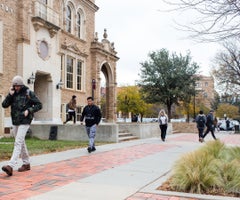MI SELECCIÓN DE NOTICIAS
Noticias personalizadas, de acuerdo a sus temas de interés

By Michelle Hackman and Douglas Belkin
U.S. enrollment of international students declined for the second year in a row, sending waves of unease across American colleges and universities, which see students from abroad as a buffer against the falling number of U.S. high-school students graduating each year.
The number of new international students enrolling at American institutions fell by 6.6% during the 2017-18 academic year, on top of a 3.3% decline the year before, according to a report by the Institute of International Education released Tuesday. The drop takes the number of new students back to the level seen three or four years ago.
Meanwhile, the total number of international students in the U.S. plus those working here on a student visa rose by just 1.5% this year. That was down from average annual growth of 6.1% over the past decade, a period during which enrollment of international students doubled.
Foreign students are big business: They pumped $42 billion into U.S. college and university coffers in the 2017-18 school year alone.
Students from abroad are still flocking to the coasts, but are less interested in the South and Midwest.
The shift is due to a combination of politics, fear, geography and branding, said Alejandra Sosa Pieroni, an international recruitment expert with Ruffalo Noel Levitz, a company that consults with colleges to improve enrollment.
“Students are not feeling welcome in some states, so they are looking beyond those states and heading to places where they will feel welcome,” she said.
The slowdown comes as U.S. schools struggle with demographic and revenue challenges due to the falling number of Americans graduating from high school. As a result, U.S. colleges and universities have become increasingly dependent on revenue generated from international students. Public schools often charge international students more than what domestic students pay.
The U.S. is also losing students to English-speaking countries such as Canada, Australia and the U.K, which have all seen growth in the past year.
“We’re hearing that they have choices; we’re hearing that there’s competition from other countries,” said Allan E. Goodman, president of the Institute of International Education.
Graduate schools were hardest hit among all segments of the higher-education market: Enrollment fell by 2.1%.
“It has become increasingly difficult to get a student visa in my country with the policy nowadays,” said Mohamed Gumaa, a master’s engineering student from Sudan who is studying at Texas Tech University.
China remained the largest single source of international students, accounting for about a third of all students who come to the U.S. for postsecondary degrees. The number of students coming from Canada and Mexico, meanwhile, fell by 4.3% and 8.1%, respectively.
The Northeast enjoyed the highest rate of growth in the number of overall international student visas at 3.4%, followed by the West at 1.9% and the South with 0.9%. International student visas in the Midwest fell 0.4%.
“There seems to be a higher level of comfort” in big cities and coastal regions, said Brad Farnsworth, vice president of Internationalization and Global Engagement at the American Council on Education, a Washington lobbying group representing colleges and universities.
Carol Spradling, director of the school of computer science at Northwest Missouri State University, said international enrollment began declining precipitously two years ago, following a “perfect storm” that included President Trump’s election with his tough talk on immigration and the shooting of an Indian immigrant worker in Olathe, Kan. The downturn, she said, had a huge impact on her school’s finances.
Schools in New England have seen gains. Kregg Strehorn, assistant provost for enrollment management at the University of Massachusetts, Amherst, said the question that most often comes up when talking to international families is whether they should be concerned about guns.
“That plays in our favor because I say, ‘Oh, let me tell you about Amherst, Massachusetts,’” he said, referring to the town’s safe reputation and tough gun policies.
Según balances de Trading Economics, Estados Unidos sigue liderando la cantidad de este metal en guarda; en América Latina es Venezuela y Brasil
Su esposa, Begoña Gómez, está siendo investigada por supuesto tráfico de influencias, según confirmó un Juez de Madrid
Warner Bros. Discovery Latin America tendrá derechos de representación en la región de Marca, Expansión y El Mundo, por mencionar algunas